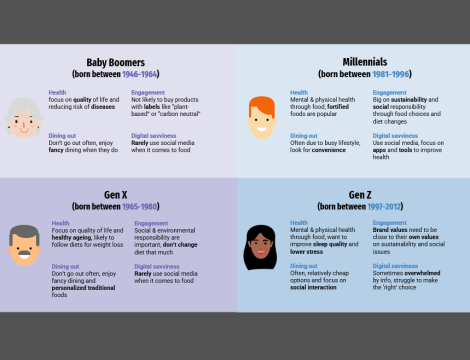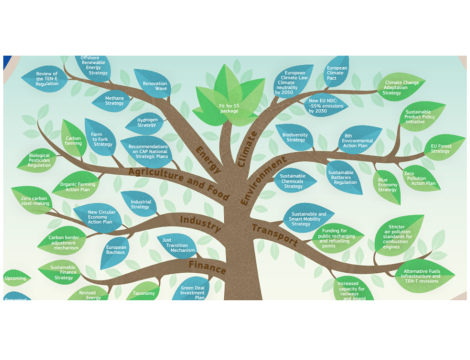Generational Gastronomy: Understanding Unique Eating Habits
This article is part of a series of short blogs by the Food & Agri team of Anders Invest. Here, we outline our perspectives on key themes that are relevant to the Food & Agri sector and explain how we try to make an impact with our portfolio companies and investment strategies. In this piece, we delve into the various generations: Baby Boomers (born between 1946-1964), Gen X (born between 1965 and 1980), Millennials (born between 1981 and 1996), and Gen Z (born between 1997 and 2012). What makes their eating behavior unique? And what trends and similarities emerge?
Health: A Cultural Shift
Health is a universal value, but the way different generations approach it varies significantly. For Baby Boomers healthy eating is central, especially because they are becoming older and are developing age-related ailments. Therefore, they see food as a way to improve their quality of life and stay healthy for longer. When looking at the advantages Baby Boomers want to gain from food, these mostly relate to reducing the risk of diseases like cardiovascular disease and cancer. In order to achieve this, the Baby Boomers in are likely to focus on natural foods and are motivated to practice what they preach in terms of maintaining a healthy diet. While Gen X also sees healthy eating as central and wants to improve their quality of life to stay healthy longer, Gen X’s approach is slightly different and is focused on having a healthy weight and following weight loss diets more than other generations.
In contrast, Millennials and Gen Z are more aware of a holistic approach to health, where mental health is seen as equally important as physical health, which can for example be explained by the fact that these two younger generations report to experience more stress and mental health issues than Gen X and Baby Boomers. In practice, this means that Millennials and Gen Z are becoming more aware of the link of e.g. sugary foods to depression or of caffeine excesses to anxiety, thus leading them to avoid such foods. Furthermore, their holistic view also means that a big part of Millennials and Gen Z believe that a healthy diet is about more than calorie counting and following restricting diets. For example, many people within these generations believe that calorie counts on food packaging can have a bad effect on mental health. Though Millennials and Gen Z thus view health as having both a physical and mental component, there are also some differences in their attitudes towards food. Millennials on one hand, prefer fresh and unprocessed foods and are the biggest buyers of fortified foods, so foods with added vitamins and minerals. For Gen Z, one of the most important benefits they seek from food is to improve their sleep and downtime.
Dining Out: The Evolution of Dining Experiences
The restaurant landscape is undergoing a transformation driven by the preferences of different generations. While Baby Boomers and Gen X prefer rare but luxurious dinners with more traditional tastes and dining concepts, with gen X sometimes enjoying personalized twists to well-known meals. Millennials and Gen Z focus more on the experience and social aspect. Convenience is also paramount for these two generations. Gen Z and Millennials are aptly dubbed the convenience generations, and this concept aligns well with their dining preferences: they seek accessible moments of enjoyment that fit their busy lifestyles. They spend significantly more on dining out than older generations, but simultaneously have a smaller disposable income. This explains the growing popularity of affordable and informal dining establishments among Millennials and Gen Z.
Engagement: Food for Thought
An notable trend among Millennials and Gen Z specifically, is their increasing engagement with the societal impact of food. While all generations indicate that they consider this important, Millennials and Gen Z clearly place the most value on this. For Gen Z, food even is a way to express themselves; the majority says that the food they consume is indicative of who they are and that they can use food to show their identity and beliefs.
They value transparency, sustainability, and social responsibility in the brands they support and want to know their food choices have a positive impact on the world around them. This also greatly influences the loyalty they feel towards a brand, as a large portion of these two generations expresses willingness to pay more for a company that makes a positive impact. Their loyalty directly translates to the problems Millennials and Gen Z view in the world and their relationship towards food. Gen Z for example, is most worried about the environment and climate change, followed by Millennials. In this case, it is interesting that Millennials have more positive ideas towards the impact they can make, as they are most likely to believe that their food choices have an impact on the environment. Another slight difference between Millennials and Gen Z is that Millennials have an additional preference for smaller brands, while Gen Z supports brands that reciprocate their personal values, regardless of size.
Digital savviness: Finding Balance in Food Choices
Digital culture plays an increasingly large role in eating behavior, which is especially the case among Millennials and Gen Z: from restaurant reviews to nutritional information to new recipes, they use social media both to gain and share food-related information, like new recipes from different cultures to sharing pictures of their food online. Gen Z mostly turns to social media like Instagram and TikTok to gain advice on for example healthy eating, as they feel like they lack information from the government, educators and the food industry. Millennials on the other hand also use social media, but tend to put more trust in online apps and tools to help them improve their diet and physical wellbeing. A downside of social media and the constant influx of information is that Gen Z in particular, can feel overwhelmed, also when it comes to food. They want to consume food that looks good on pictures, while also being sustainable, ethical and socially conscious and if possible healthy. This leads to people in this generation often struggling to make, what they feel, is the right choice. Companies that can provide clarity in this regard, will therefore be ahead with Gen Z.
Each Generation Has a Unique Need
These food trends demonstrate how the Food & Agri sector is adapting to the changing preferences and values of different generations. It's clear that there's no one-size-fits-all approach; successful companies will need to adjust to the unique needs of each generation, whether it's related to health or engagement and whether it is inside the house, or out (and about).




